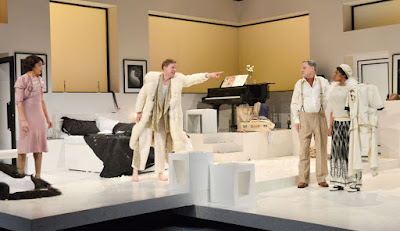MADE IN DAGENHAM
Leigh
Operatic and Dramatic Society at the Palace Theatre Westcliff
04.05.16
The Essex
première for Made in Dagenham, the Musical. And haven't LODS done
the county proud! High production values, from the design to the
orchestra to the professional-looking programme.
It's the
uplifting tale of the archetypal Essex girls who take on the might of
Ford America and the MCPs of the TUC to win their battle for equal
pay. Following in the footsteps of Billy Elliot and The Full Monty,
it's an unsubtle, manipulative show, redeemed by Richard Bean's
engaging book and Richard Thomas's witty lyrics. And here, by an
energetic, polished production on the Palace stage.
Helen Sharpe gets
some wonderful performances from a strong cast, especially of course
the women of the sewing machine room at Ford's.
Laura Hurrell is
a wonderful Rita O'Grady, the strong, if initially reluctant,
spokeswoman for the group. We see her domestic life almost wrecked by
the strike; Hurrell manages to convince both as an ordinary
working-class woman and a heroine of the industrial relations
struggle for equality. Not to mention selling some of the best
numbers in David Arnold's patchy score. Amongst the other broad-brush
characters are Kathy Ward's inarticulate Clare [her “Wossname”
number is a delight] and Emma Elliot's dolly bird Sandra. Sarah
Gallucci brings pathos as well as personality to union convenor
Connie, and Jo Whitnell is excellent value as big Beryl,
potty-mouthed and incorrigibly outspoken.
Anthony Bristoe
is a sympathetically conflicted husband, a New Man in the making,
perhaps.
The men have to
do a good deal of doubling in this show, so Monty, the Union Man, is
convincingly done by Simon Sharpe, who's also the gross club comic
Chubby Chuff. Barry Jones has three roles, including a slightly camp
Harold Wilson, superb in his number with the trio of Civil Servants.
Hard-hearted, hard-nosed US boss Tooley is powerfully played by Lewis
Sheldrake, who's also the boy Barry, target of some fruity banter
from the women. And Peter Brown works hard in multiple roles,
including Latin teacher Mr Buckton, part of a plot device which
brings together Rita and Zoe Berry's Lisa, middle-class feminist wife
of Ford UK boss Hopkins [Neil Lands]. It involves a protest against
corporal punishment in school. Unthinkable now, of course. If only
equality had been so thoroughly won.
1968, year of
revolution, is compellingly recalled. In the musical idiom of some of
the better numbers - “This Is What We Want” for example - and in
the settings – the Social Club and the Berni Inn.
Paul Ward's set
is minimal – impressive sewing machines, less impressive Cortina –
I liked the way the O'Grady's home was set before the overture:
kitchen sink, ironing board, lunchbox, Weetabix. Outstanding digital
graphics by Andrew Seal – the orange domestic décor, the Dagenham
plant – make the many changes of scene simple and dynamic.
Stunning staging
of some of the big numbers - choreography by Michelle Taylor – the
title song, and the rousing anthems that end each act: Everybody Out
and Stand Up.
Rachael Plunkett
is the Musical Director, and she's part of the great pit band under
the baton of Stuart Woolner.
















